The flight from Labuan Bajo was in a propellor-driven plane. We turned in a wide arc after leaving the runway, to look down on the town and the islands and reefs splodged throughout the coastal water. We then flew straight back across the island chain, retracing the route we had taken by boat over the preceding two weeks. Amidst green volcanoes and uncountable bays and islands fringed by azure reefs, we saw Rinjani’s peak breaching the cloud over Lombok.
We landed in Medan, the principle city in northern Sumatra around 20:00, stepping out into hot, thickly humid air. Taking Lonely Planet’s recommendation, we checked-in at Pondok Wisata Angel in the city centre. The blue walls of our little room were blackening with damp. The leaky aircon unit sounded like an aircraft engine all night. A tiny window overlooked a few tin roofs and a busy street. There was an en-suite but it just had an old handheld shower and a free-standing blue plastic toilet, which doubled as our sink. A stench emanated constantly from the toilet, ranging from sulphurous eggs to something resembling fried chicken. Seriously, chicken-and-egg but in a novel form. This was weirdly fitting as it had been a quirk of our trip that most nights’ meals had both chicken and egg in them and we had made this a theme for our gathering memories.
We weren’t ready to make the journey to any of the rainforest sites inland so we agreed to stay a full day in Medan and leave early the following morning. The city could have been worse. Like so many asian cities it was typically dirty and busy. But it was also modern and functional in ways. There were some glitzy shopping malls and fast food outlets. Car horns were at a minimum and there were pedestrian crossings at the traffic lights, although the lights were largely ignored. We beat the street all day. We passed an old colonial district with shuttered windows and decorative streetlights. Then past open sewers, running blue-grey with bacteria and roiling with insects. We weaved through the clothing market and into the fruit market, where we filled bags with avocados, mangos, little bananas and an unidentified green spiky thing. When we returned to the guesthouse my foot was swollen again, throbbing and hot. We went across town with two other guests, Magnus from Denmark and Rose from Los Angeles, for dinner at an authentic Indian place. We took a
The next morning, the street outside was packed with people congregating at the city’s main mosque, next door to us. It was a holy day. After morning prayers, cows were to be slaughtered at mosques throughout the city and, presumably, the muslim world, then given to the poor. Rather than witness the spectacle, we got moving. A bechak took us to a private bus stand, where we bought tickets to Kutacane, in the jungle to the west. There was a choice of ticket classes, “Royal” or “Executive” and no indication of a difference except in price; Rp80,000 or 60,000 respectively. We took Royal and jumped into a nine-seater minibus with sweat-generating seats upholstered in gaudy blue polyester covers with yellow fringing. The windows had gold curtains and tissue boxes mounted above them. There was an LCD TV hanging precariously at front, which was used to play the cheaply-produced videos that accompanied an endless, full-volume ensemble of generic Indo pop music.
The city stretched on for an age, seething with engines, horns and a smog of fumes and dust. But where the city ended, the jungle began. We climbed a snaking, narrow road through lush, cloud-filled valleys. We passed plantations of many different crops, from maize to chillies, carpeting the valley floors. Pretty little towns and rest stops coursed by. After a couple of hours the road deteriorated to a shambles of broken asphalt only wide enough for one vehicle. Thus we bounced for hours as we slowly made our way to the west.
I already needed a wee when we departed so I kept water intake to a minimum and patiently endured the four-hour first leg. When we reached our rest stop it was likely to go one of the two ways that such places go: dire or wonderful. It was a typical set-up, a large canteen with grotty toilets attached, serving a standard hot meal, tea, coffee and a range of sweet snacks. Sometimes the food at such places is cheap and delicious, sometimes it’s the opposite. This was one of the good ones, and it epitomised a familiar experience I had been craving for months. We pointed at some unrecognisable bowls of food and managed to get served with two portions of steamed rice, some cooked vine leaves and a fried egg accompanied by a dollop of red chilli paste. It was simple and delicious, as it should have been. We ate with our hands until our lips were burning, then washed our hands and faces at a communal tap. For me, there is a special beauty in that washing session after a meal abroad, where everyone visiting the tap is tingling with chilli and happily stuffed. I sliced one of our mangos with my pen-knife and we devoured it in seconds, it was perfectly ripe. We ordered milky coffees to finish but our grumpy driver made it clear he didn’t want to wait. As we left, the staff, with whom we had been sharing smiles and attempts at basic Bahasa Indoneisan words, looked confused. We shrugged plaintively, thanked them, paid Rp 18,000 for the lot, and left the coffees to be wasted. Moments later I heard a shout. One of the servers was shuffling after me with a plastic shopping bag and a broad smile. Inside the bag was a smaller bag into which the server had decanted our coffees, tied the top with an elastic band and thrown in a straw.
BTN bus company “Royal Class” terminated in Kutacane just before five, exactly at the moment that a ghostly white column of rain swept in and battered the town. We stuffed ourselves into an absurdly small bechak, with my leg and one of my bags hanging outside in the rain. We then transferred into the back of a local taxi bus with open sides, huddled with some local women and one young son as the rain hardened and came in on all sides. But ten minutes up the road it was dry again and we were cruising up a river valley into the steaming jungle. I spotted a sign for a guesthouse and realised we hadn’t told the driver exactly where we were going. I banged on the cab window and shouted “Friendship Guesthouse!” and the driver instantly hit the brakes, veered into a rough driveway and pulled up outside our destination.
Friendship Guesthouse was just as we had hoped. The main building was a wooden lounge and kitchen with open sides, looking over some bungalows scattered throughout a lush garden and, beyond that, a river and the slopes of the jungle hills. The lounge had tables and chairs for thirty people and the walls were covered in maps and photos from wild places. Two other guests were seated in the lounge, a pair of westerners about our age, a woman and a dreadlocked man. When I said hi to them the woman replied quietly and the man didn’t look up. I hoped they wouldn’t be those arrogant “we were here first” kind of travellers. But I made guacamole with our avocados from Medan and shared them with the guests. They turned out to be a couple, Angelika and Marcus, from Bavaria. We later discovered that Marcus had just had bad news from home and was in the process of cancelling the rest of their travels and buying the first flights home. When he finished, he joined us and a mischievous laugh broke out from him in frequent bursts. They had four days until their flight so they planned to spend the next three in the jungle. We agreed to join them. I was worried my foot would hinder our trek but took the gamble and in the end it caused no problems. I was also concerned about the quality of information available on the trek. Rarely can I find much resource for understanding the local flora, fauna and geography, and the guides are typically limited. So I broached the subject with our new companions, “Any interest in animals or nature?”
Angelika smiled and nodded at Marcus. “He’s a zoologist”.
Over breakfast the next morning, the guesthouse owner Ahmad introduced our guide. The man was diminutive but with strong, healthy features. He seemed shy and spoke almost inaudibly, telling us his name was John and handing-out cotton garters to protect from leeches. I feared he wouldn’t talk or know much but I had misjudged him. A toothy, boyish smile exploded on his face at any opportunity and he joked with us constantly. He told us his name, his real name, was John Kennedy, and the initials JFK were carved into the wooden handle of his parang.
John took us up the main road through the village and turned into a narrow, leaf-covered path into the trees of the Gunung Leuser national park. He asked us to be quiet from now on. Immediately we were surrounded by thick jungle, sweaty, noisy, creeping carefully amidst roots and mud and streams. Buttressed columns of tree trunks soared into the sky, draped with vines and moss. John occasionally stopped and peered up through gaps into the canopy, listening and watching. He had been guiding there for twenty years, and living in the jungle all his life. It was his home and he was tuned to it. He identified every sound.
We heard barks and howls but saw no animals besides insects for an hour or two. These included the largest ants I’ve ever seen, plus giant centipedes and millipedes, all of which we held and played with. Butterflies in endless array flitted around us. John rushed a few steps ahead and looked up. Some Thomas Leaf monkeys were crashing about in the trees above us. They are pretty monkeys, grey with white chests and faces and long tails. Then there was a howl, like a lonely siren in the sky. John was clearly excited. He ran about, trying to find a clear view up to where the sound had come front. Howl like lonely siren. John excited, darted to better spot. “Gibbon!” he he hissed in a whisper-shout. Way up, distantly above us, was a brown man-like figure, holding on with one hand at the end of a long arm and gazing down on us. It then swung between a few branches, demonstrating the rare agility of the gibbon family. It descended to a lower position and we were able to loop round on high ground to get close to its level, a rare treat. John seemed as happy as us, saying “fucking awesome” in a fake English accent.
As we walked on we saw some old orang utan nests in the trees. John explained how they made a new nest in a different location every night. He explained that there were no human tracks so we were probably alone in the forest, when there would typically be several groups during high season. But when we arrived at the river bank for lunch we were sad to see two Indonesian teenagers making a camp there. When we reached them they approached us, smiling, and introduced themselves as Savar and Salman, asking if we’d like a hot drink. For the next three days they cooked, housed and entertained us with humbling passion.
The camp was a work of art. John and his two teammates stood stakes in the ground and stretched transparent plastic sheeting over them in two layers, forming a roof and walls, with a small moat around the outside and a base of leaves, tarpaulin and camping mats. They made two tents this way, one for our group of four and one for themselves, each big enough to walk around in and impervious not only to the tropical rain but also the fire ants and leeches. They raised washing lines for our clothes and cooked a delicious curry while we bathed in the rapids beside the camp.
We left our belongings at the camp and used it as a base for the rest of the trek. It was called a “trek” but it was more of a ramble, walking slowly on undulating paths around the same area of forest without it ever being strenuous. That afternoon we entered a small clearing where a vine had been cut to become a swing. In the next tree over, way above, was a lump fringed by an orange glow. It was a female orang utan. We watched her for perhaps an hour, occasionally breaking the reverie to swing on the vine, which didn’t bother her. She sat about, picking fruit, chewing bits and dropping much of it to the ground. At one point she had a pee and we observed with glee. I was thinking “go on, give us a poo, come on!” Marcus had a newer version of the same camera as me but he had a powerful 100-400mm zoom lens which he let me use a few times.
Moments after we set off again john got excited, it was a big male orang utan. We ran through the trees, over a stream and up and down its steep banks. But we were chasing the wrong primates, led astray by some monkeys. Retracing our steps we found the male though, just in time. He had found his nest spot for the night and we watched him build it around him, curling leaf-covered branches under his bum until he had what looked like a sturdy and comfortable bed. We then spotted another one and followed it as it progressed slowly through the trees. It was a mother with a young son or daughter following a few metres behind, both of them making kissing noises in the air to communicate with each other. Then we spotted that the mother had a newborn clinging to her fur. “One week old!” Cried John, and high-fived us.
That night the boys cooked a huge dinner: seasoned fried chicken, a kind of sweet eggs, vegetable curry and rice. Savar built a fire surrounded by a pyramid of wet kindling. He poured candle wax on the fire so it burned slowly for hours, glowing from inside the pyramid like a TV. Around us, fireflies flashed on and off and the eyes of spiders glowed in our torchlights. The moon illuminated the forest and we fell asleep surrounded by its restless life.
The next day we walked similar paths, never very far from the camp. We followed the lonesome howl of a gibbon and found it in the canopy. It was the same colour as the previous one, perhaps the same animal. It let out the signature cry: “Oowa oowa oowa oowa, oooh”. The sound filled the valley. John called back and the gibbon responded. We watched on as the two species conversed. We saw more monkeys and orang utans throughout the morning and when we returned to camp for lunch we really were not alone this time. Two Europeans had arrived with a guide and a porter. Nevertheless, it still felt like our jungle.
In the afternoon John stayed at the camp and let Salman, the younger of the team, take us out so he didn’t have to hang around all day. He led us across the river and for an hour or so along the opposite bank to some hot springs. Boiling water was emanating from the rocks and mixing with the river. At the source, long tendrils of slimy extremophile bacteria were swaying in the bubbling water. Steam rose up in columns and drifted into the jungle. We waded across a narrow section of rapids and bathed together in some pools beyond. Salman had brought chocolate biscuits with him, making a strange treat in the hot water. He fashioned a stick as a cigarette holder so he could have a smoke while bathing.
It began to rain. We revelled in the cool droplets as the rain intensified into a torrent. Our clothes, shoes and my bag soaked through on the river bank. I wondered if it was a bad idea sitting in a river in a rainstorm but trusted Salman to know best. He rallied us to leave. The bliss of lazing in the water changed rapidly to the serious consideration of crossing the rapids again, as we heard and felt the river rising in moments. Salman went across first, I waded in behind until I felt my feet being pulled from underneath me, then reached over the fastest water and handed him my bag, with my camera kit inside. He was half my size but stronger in the water. Together we hauled the girls through the water, each one taken by its flow instantly. We put on our sopping clothes and got moving. The river had turned brown and was accelerating. The path was running with yellow water. Maeve slipped and slid down some tree roots but got wedged before falling far. The ground collapsed under Angelika’s foot and she too nearly fell down the bank to the river below. It was a long, fast trudge through failing light back to the camp.
When we arrived we could see John and Savar at the camp, on the opposite bank of what was once our river to play in, now a ferocious deluge. John and Savar jumped in and swam hard against the flow to reach us. They took our shoes and any spare clothes off us and hurled them across the river. Miraculously, every item landed safely on a rock on the other side. Savar took my bag and clambered to a point upstream where he could wade it across. Then we each took our turn at swimming into the rapids, to be caught by our crew as we were swept down.
All seven of us huddled into the crew tent to keep dry. There was enough room for us all to sit comfortably with another feast laid out in the centre, lit by candles. John talked about previous years in his volatile home. Before the civil war, the tsunami and the bomb in Bali, tourists were plentiful in Ketambe. John’s guide skills were in such demand he used to hide deep in the jungle for some peace. When the war filled the region it was “very scary”, he said. The rebels used the jungle to hide, never staying in the same place for more than one night. They needed experts to guide them so they asked John for help. “But I don’t want to kill anybody”, he told them. If the Indonesian army saw a single rebel visiting John’s house he thinks they would have killed his whole family so he took his family away from his beloved home. He went to what seems to have been the local WWF office and asked for a job. They asked him how much he could pay. To work, he would have to pay a fee. They offered him a security position, sitting in a chair all night. “But I am guide, I know the jungle”, he insisted. He also spoke English. They didn’t care. They wanted Rp10M a year for a Rp1.8M a month wage. Like everyone else, the agent thought he was rich because he communed with white people and nobody believed him that that was ridiculous. He gathered five million, offered it, and they settled on seven. He paid for a job he hated for the next few years.
John’s wife was arranged for him. She was under the same illusion that he must have been wealthy so she was disappointed to find out otherwise. She didn’t care about him, he told us. He tried to make her jealous, claiming that he would be taking a lone white girl on his next tour, but it was impossible. She insisted that he take another job to get more money. “But I love the jungle”, he said. He really did. It was his home and everyone would have to accept that, in spite of marriage, money and militia.
The rain ploughed on and the river growled deeper, occasionally rumbling as large boulders were shifted under the surface. The sky choked with crackling thunder. John entertained us with his “jungle tricks”, a series of parlour games using a plant stalk cut into sections to make different puzzles. We replied with our own efforts at tricks and games. Savar and Salman trumped us all with a rendition of the legendary 1,000 Hand Dance. They kneeled facing us, shoulder to shoulder, swinging their upper bodies and clapping their hands together or against their chests, fast and synchronised. I felt something rubbing in my armpit. I took off my top but it was nothing. Then as I replaced my top we saw a huge swollen leech on the tent floor. Blood was draining from a hole in my armpit.
In spite of the rain Savar and John frequently wandered the camp, checking the river level and looking for animals with their torches. Savar found a civet for us, its huge eyes shimmering in the torchlight. They also constructed a healthy fire by building it under plastic sheeting during the day and burning through the sheeting as the fire took hold. Before bed they hung our trousers by the fire and planted stakes all around, placing each of our shoes on one. As we settled down, I leaned out of our tent to wring-out Maeve’s top. John and Savan were checking the river with their torches. What had been our swimming pool that afternoon was now unrecognisable. A large rock in the centre of the river had been overwhelmed and was now a waterfall. A few more inches and the site would have been flooded but we weren’t concerned, we had the perfect tool for the job, we had John Kennedy.
On the final day of the trek we dressed in wet clothes and walked the same paths as before. The forest felt different, dark, dripping wet and eerie under grey skies. We saw nothing all morning except a family of Leaf monkeys cuddling each other to sleep. Almost back at the camp for lunch we found several orang utans, including a mother and her young. We sat and watched, closer than in previous encounters so their features were easy to see. Then John led us home, crossing out of the national park and back into what he called “Facebook Country”. He had told us that in the early years he hated being a guide because he couldn’t stand to say goodbye to his new friends. Now he was used to it, he said, he accepted that travellers always move on, rarely come back. Yet we were all said to say goodbye. John said “you’re good people, lovely people”. We told him likewise. We all meant it, the likes of John are what an adventurer hopes for but cannot buy. I hope we see him again.

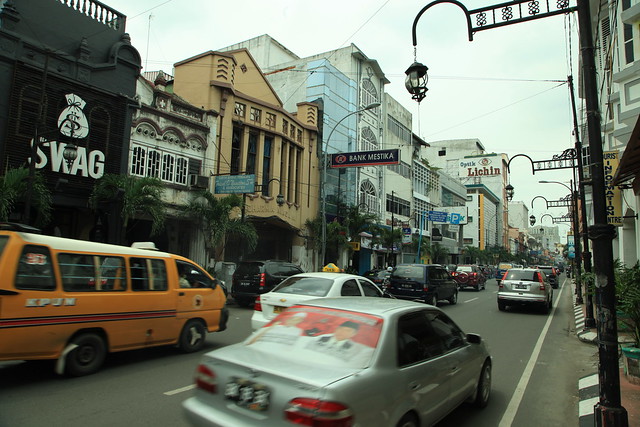
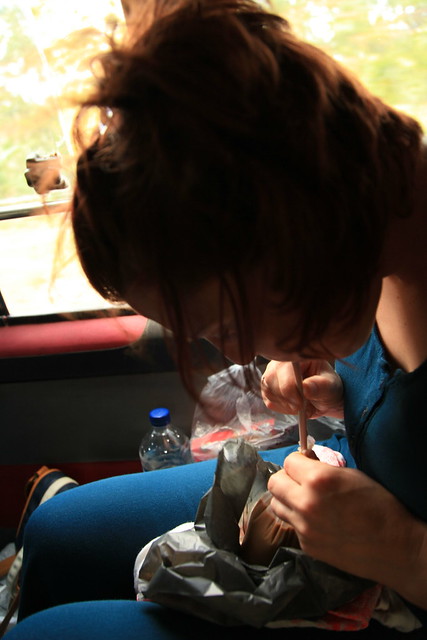

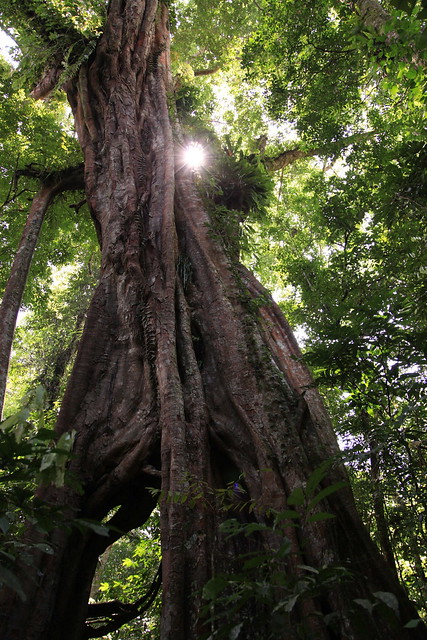
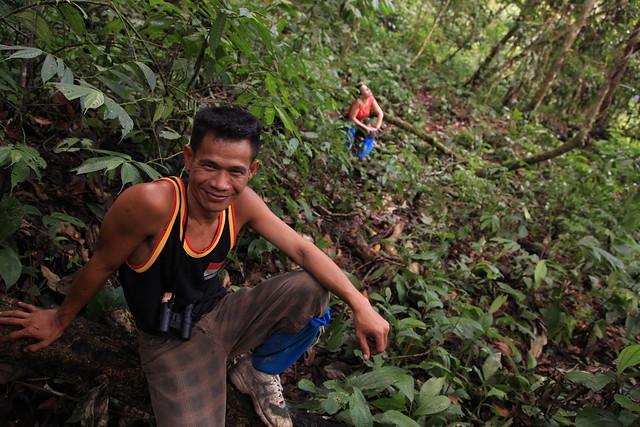
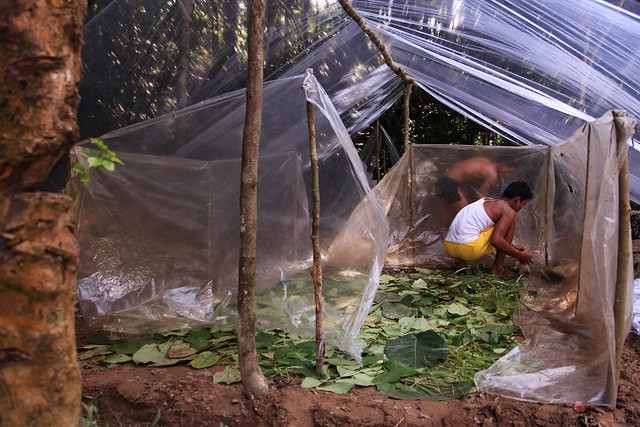
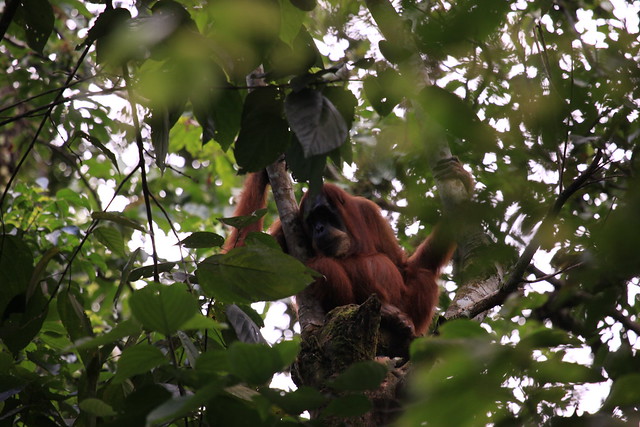
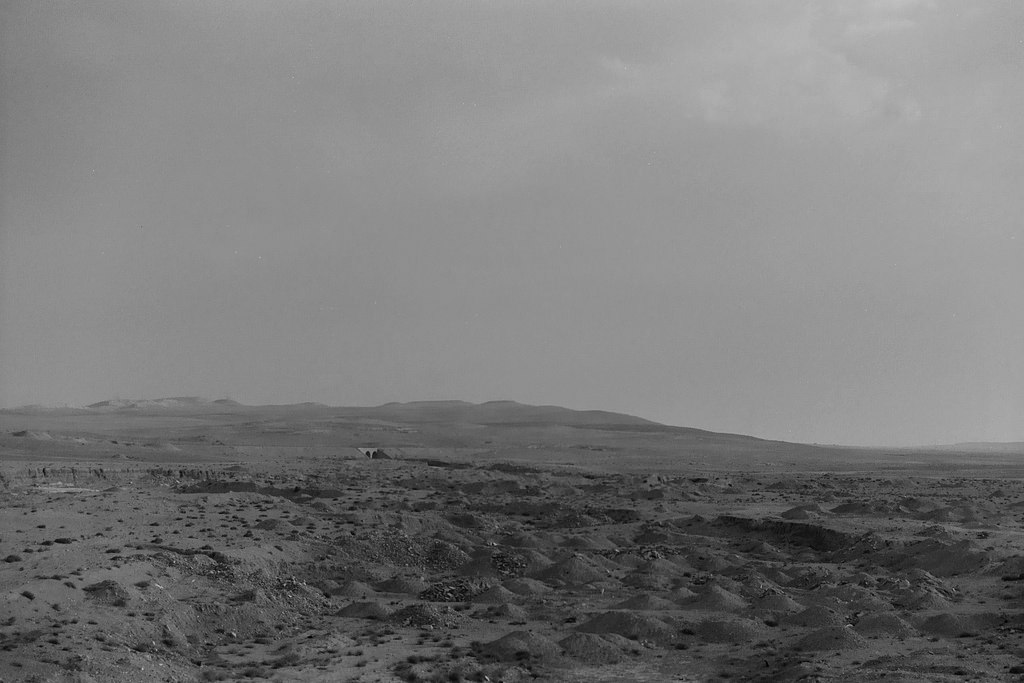


Thanks for sharing this travel moment. 🙂
13th of april I am starting my 60 days solo journey.
I was looking for some information about the guides, John his name can be found on many blogs/websites.
I love it that you capitalised the human part of the guide as well, not only sharing information “We saw monkeys omg”, but also sharing the background story.
As a script writer and a future director / psychologist (dream big 😉 ) I can really appreciate that extra information.
I have a question though, how much were the costs for the 3 days in the jungle trekking?
Thanks in advanced!
dutch dude
Ack! I didn’t spot your comment notification until just now. A little late I guess.
In any case, not much use to you as we can’t remember the costs, sorry. We took a shared microbus from Medan to Ketambe and booked the tour from Friendship Guesthouse, as a group of four. I doubt it was expensive, we are cheapos!
Thank you for your support. Honestly, comments like yours give cause and motivation to what would otherwise just be a personal creative hobby. It makes me want to make more. And that, I suppose, is what I would say back to you. There’s nothing infeasible about your dreams of writing, directing, psychology, etc. and your travels could be a perfect base for all of them. My only advise would be to use your travels to lay down some content (ideas, writing, film, etc.) and, importantly, publish it. Publish it to nobody, but publish it anyway, because that completely transforms your style and structure, by forcing yourself to finish each piece and put it out there. And if you’re ever bored, here’s the video of the same trip so you can see John and everything else: https://youtu.be/L6KFtNFCzEo (Bali section starts at about 20′:20″).
Good luck Dutchman, happy travels!